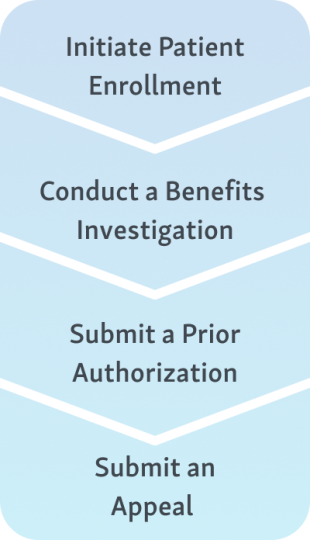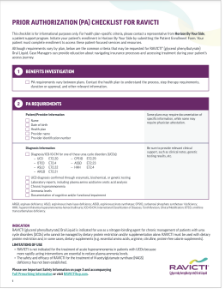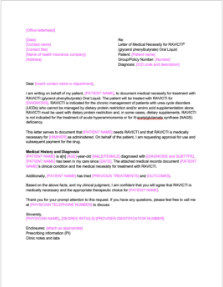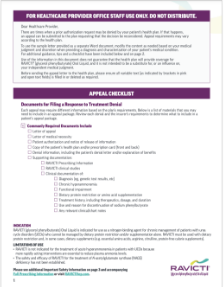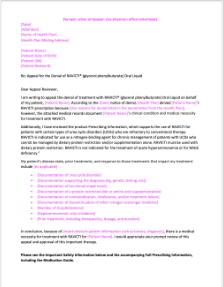INDICATION
RAVICTI (glycerol phenylbutyrate) Oral Liquid is indicated for use as a nitrogen-binding agent for chronic management of patients with urea cycle disorders (UCDs) who cannot be managed by dietary protein restriction and/or supplementation alone. RAVICTI must be used with dietary protein restriction and, in some cases, dietary supplements (e.g. essential amino acids, arginine, citrulline, protein-free calorie supplements).
LIMITATIONS OF USE
- RAVICTI is not indicated for the treatment of acute hyperammonemia in patients with UCDs because more rapidly acting interventions are essential to reduce plasma ammonia levels.
- The safety and efficacy of RAVICTI for the treatment of N-acetylglutamate synthase (NAGS) deficiency has not been established.
IMPORTANT SAFETY INFORMATION
CONTRAINDICATIONS
- Patients with known hypersensitivity to phenylbutyrate: Reactions include wheezing, dyspnea, coughing, hypotension, flushing, nausea, and rash.
WARNINGS AND PRECAUTIONS
- Neurotoxicity: Phenylacetate (PAA), the major metabolite of RAVICTI, may be toxic at levels of 500 micrograms/mL or greater. If symptoms of vomiting, nausea, headache, somnolence, or confusion, are present in the absence of high ammonia or other intercurrent illness which explains these symptoms, consider the potential for PAA neurotoxicity which may need reduction in the RAVICTI dosage.
- Pancreatic Insufficiency or Intestinal Malabsorption: Low or absent pancreatic enzymes or intestinal disease resulting in fat malabsorption may result in reduced or absent digestion of RAVICTI and/or absorption of phenylbutyrate and reduced control of plasma ammonia. Monitor ammonia levels closely.
ADVERSE REACTIONS
The most common adverse reactions reported in clinical trials (at least 10% of patients) were:
- Adult patients: diarrhea, flatulence, and headache occurred during 4-week treatment (n=45) with RAVICTI; nausea, vomiting, diarrhea, decreased appetite, dizziness, headache, and fatigue occurred during 12-month treatment (n=51) with RAVICTI.
- Pediatric patients ages 2 to 17 years: upper abdominal pain, rash, nausea, vomiting, diarrhea, decreased appetite, and headache occurred during 12-month treatment (n=26) with RAVICTI.
- Pediatric patients ages 2 months to less than 2 years: neutropenia, vomiting, constipation, diarrhea, pyrexia, hypophagia, cough, nasal congestion, rhinorrhea, rash, and papule occurred during 12-month treatment (n=17) with RAVICTI.
- Pediatric patients less than 2 months of age: vomiting, rash, gastroesophageal reflux, increased hepatic enzymes, feeding disorder (decreased appetite, hypophagia), anemia, cough, dehydration, metabolic acidosis, thrombocytosis, thrombocytopenia, neutropenia, lymphocytosis, diarrhea, flatulence, constipation, pyrexia, lethargy, and irritability/agitation occurred during 24-month treatment (n=16) with RAVICTI.
DRUG INTERACTIONS
- Corticosteroids, valproic acid, or haloperidol may increase plasma ammonia level. Monitor ammonia levels closely.
- Probenecid may affect renal excretion of metabolites of RAVICTI, including phenylacetylglutamine (PAGN) and PAA.
- CYP3A4 substrates with narrow therapeutic index (eg, alfentanil, quinidine, cyclosporine): RAVICTI may decrease exposure to the concomitant drug.
- Midazolam: Use of RAVICTI decreased exposure of midazolam with concomitant use.
USE IN SPECIFIC POPULATIONS
- Pregnancy: RAVICTI should be used with caution in patients who are pregnant or planning to become pregnant. Based on animal data, RAVICTI may cause fetal harm. Report pregnancies to Amgen at 1‐866‐479‐6742.
- Lactation: breastfeeding is not recommended during treatment with RAVICTI. There are no data on the presence of RAVICTI in human milk, the effects on the breastfed infant, nor the effects on milk production.
Please see Full Prescribing Information.

